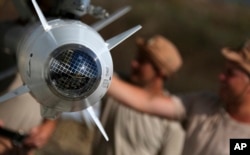Russia on Wednesday shot 26 long-range cruise missiles from its navy ships in the Caspian Sea across Iraqi airspace to hit both anti-government and Islamic State targets in Syria, further ramping up its fierce bombing campaign there.
Already taken aback by Russian planes crossing into Turkish airspace and Moscow’s unapologetic bombing of U.S.-backed rebels fighting Syrian leader Bashar al-Assad, U.S. officials on Wednesday said Moscow’s strategy is misguided.
"The kind of military strategy that Russia seems to be pursuing right now is not at all likely to be successful in advancing their interests inside of Syria," said White House spokesman Josh Earnest. "In fact, we actually think that the strategy that Russia is now pursuing military is likely to be counterproductive."
U.S. coalition aircraft, meanwhile, continued their 14-month campaign of bombing missions against IS targets in both Iraq and Syria.
Defense officials said Washington is working to ensure that there is not "an unsafe separation between aircraft," and called on Iraq to check its airspace.
But :it’s happened," said Pentagon spokesman Capt. Jeff Davis.
"We do urge our partners, Iraq among them, to be skeptical about these things, to ask hard questions about what’s going through their air space," said Davis.
Alternative coalition
In the past two weeks, Russia has forged a de facto alternative coalition with Syria, Iran and Iraq to help defeat the Islamic State group.
Moscow’s more forceful role in the region has further deepened the sectarian and political divides in Iraq.
Baghdad's pro-Iranian government has welcomed the current intelligence-sharing partnership.
"We need to develop cooperation with these countries for the defense of Iraq and to protect our people," said Baghdad government spokesman Saad Hadisi.
One leading Shi'ite politician went even further.
"In the upcoming few days or weeks, I think Iraq will be forced to ask Russia to launch air strikes, and that depends on their success in Syria," Hakim al-Zamili told Reuters in an interview.
Sunni reservations
Sunni lawmaker Haider Mollah said the Sunnis would not support such a move.
"The recent suggestions that Iraq should join the quartet coalition consisting of Syria, Iran, Russia and Iraq are unofficial," Mollah told VOA.
"These are comments made by the commanders of the Shi'ite militia in their talks with the Iranians, Syrians and Russians," he said. "Any such agreement must be coordinated with Iraqi government and international coalition joint task force. We won’t approve such a deal."
In Kurdistan, home to Peshmerga forces who have been keeping Islamic State militants at bay in northern Iraq, feelings are similarly split.
Saadi Ahmad Pira, spokesman of the pro-Iran Kurdistan opposition party PUK, welcomed Russia’s participation.
But the more pro-Turkey and pro-West Kurdistan regional government warned against allowing the battle against IS to dissolve into a proxy war between regional and world powers.
"We do hope that all countries interested in peace and stability will be unanimously fighting ISIS and not to use the fight of ISIS as a pretext for geopolitical rivalries, or to use it to weaken their rivals or their competitors," said Hemn Hawrami, foreign relations chief of Kurdistan's ruling KDP party.
Pentagon correspondent Carla Babb and White House correspondent Aru Pande contributed to this report.






